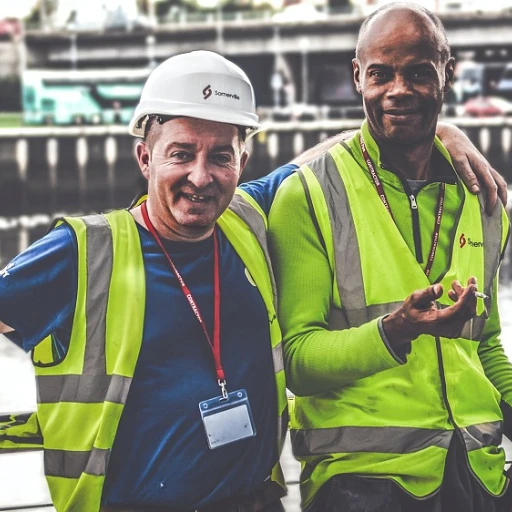
Understanding the Landscape of Felon-Friendly Employers
Recognizing the Shift Towards Felony-Friendly Employers
The job market has seen a substantial transformation in recent years, with an increasing number of employers recognizing the value of providing second chances to individuals with criminal records. This shift towards inclusivity has opened many doors for people with felony convictions, offering them hope for rebuilding their careers.
With these changes, it is crucial to identify the top felony-friendly employers that support second chances. Companies leading this movement have created hiring practices that focus less on a candidate's past and more on their ability to contribute positively to the organization. By valuing potential and skills over records, they offer meaningful job opportunities to individuals often marginalized.
Why Employers are Adopting Fair Chance Hiring
Several factors contribute to this growing trend, such as advocacy for fair chance hiring policies and the increasing awareness that individuals with felony convictions can be valuable employees. Employers are beginning to understand that supporting such individuals can enhance their workforce diversity and bring about creative problem-solving approaches.
Organizations also recognize that felons who receive job opportunities are less likely to reoffend, thus contributing positively to the community. Hiring people with felony convictions can also improve a company's reputation and build trust within the community, as it showcases a commitment to social responsibility and inclusivity.
Identifying Felon-Friendly Employers
For job seekers aiming to find a job at a supportive company, understanding the marketplace is the first step. Research companies with a known record of hiring people with criminal backgrounds and seek testimonials or success stories from other felons who have successfully joined the workforce. Initiatives like "Ban the Box" have been instrumental in encouraging employers to look beyond a criminal record when evaluating job candidates, making it easier for people with felony convictions to present their qualifications and experiences without stigma.
Overcoming Stigma and Building Confidence
Building Confidence in the Face of Stigma
Facing the stigma associated with having a criminal record can be one of the most daunting aspects for job seekers with felony convictions. It’s important to acknowledge these challenges while focusing on your strengths and capabilities. Breaking through this barrier begins with building a strong sense of self-worth and reflecting on your skills and achievements that remain valuable in any job market. Start by looking into the concept of "occupational discrimination" to understand how it may affect your hiring prospects. This knowledge positions you to better counteract biases that may arise during your job search.Highlighting Skills and Achievements
Everyone has a unique set of skills and experiences that can be assets to potential employers, even if past felony convictions suggest otherwise. Instead of being defined by a criminal record, emphasize skills, certifications, training, or volunteer work that demonstrate your ability to contribute positively to a workplace. Show prospective employers that you have taken advantage of available opportunities to become a valuable asset to any organization.Practicing Self-Acceptance and Resilience
Embracing your past as a part of your personal history rather than a barrier can be transformative. Accepting your experiences allows you to grow from them while maintaining a focus on a brighter future. Many felon-friendly companies appreciate employees who have demonstrated persistence and resilience in overcoming their past challenges. While the journey might be longer, remember that continuous improvement provides more than an opportunity - it fosters personal empowerment.Forming a Supportive Network
Leverage your existing connections and find community resources dedicated to supporting individuals with felony convictions. Support groups, forums, and community workshops are excellent places to meet like-minded individuals or mentors who can provide advice and resources as you navigate challenges on your career path. By forming these connections, you can build a network that supports your quest for professional reinvention, creating pathways to jobs and opportunities aligned with your goals.Crafting a Compelling Resume and Cover Letter
Showcase Your Strengths and Tailor Your Application
Finding opportunities with employers that support second chances often means focusing on how to best present yourself in both your resume and cover letter. Individuals with felony convictions must strategically highlight their skills and experiences, emphasizing the qualities they can bring to a prospective employer.- Emphasize Skills Over Records: Highlight any skills or certifications acquired during incarceration or through past job opportunities. This demonstrates your commitment to personal and professional development.
- Be Honest and Direct: While it's important to be truthful about your criminal history, don't dwell on it. Provide a brief explanation and quickly pivot to how you have grown as a person and what you've achieved since your conviction.
- Tailor Applications: Customize each resume and cover letter for the specific job and employer, showcasing why you are a good fit. Many felony-friendly employers appreciate transparency and the unique perspectives that such life experiences can bring.
- Leverage Supportive Resources: Utilize online resources and local services aimed at helping individuals with criminal records. These can offer additional guidance on what to include in your application materials.
Networking and Leveraging Community Resources
Building Connections: The Key to Unlocking Opportunities
When you're navigating the job market with a felony record, networking is a powerful tool that can open doors to opportunities you may not find through traditional job searches. Establishing relationships within your community and connecting with others who understand your challenges can be a game-changer. Start by reaching out to local organizations that focus on supporting those with criminal records. Such groups often have connections to employers who offer a second chance to felons. These networks may either directly help you find job opportunities or guide you to other resources that will be beneficial in your journey. Consider joining online forums and social media groups where people share experiences and advice about finding felon-friendly employers. Engage in discussions, ask questions, and contribute your insights. This not only increases your visibility but also puts you in touch with individuals who can potentially refer you to jobs or even hiring managers willing to give you a chance. Volunteering can also be an effective way to network. By volunteering, you can demonstrate your reliability and work ethic, which can lead to recommendations or job offers. It’s important to remember that employers want to see evidence of your commitment to turning a new leaf, and volunteering provides that opportunity. Connecting with employers is not solely about finding a job; it's about establishing relationships that could lead to long-term career opportunities. Building a positive rapport with current employees and employers in the sectors you're interested in can often lead to unexpected job offers. While overcoming the stigma of a criminal record might seem daunting, forging genuine connections can be a significant step toward finding fair chance opportunities.Preparing for Interviews and Handling Tough Questions
Strategies for Interview Success
Preparing for an interview can be a daunting task, especially for those with a felony conviction. However, with the right tactics and mindset, you can make the process smoother and enhance your chances of landing a job. Here are some strategies to help people with criminal records feel more confident and prepared during this critical step in the job-seeking process.
It's essential to understand that friendly employers are increasingly offering opportunities to those who have been previously overlooked. This shift towards fair chance hiring means you can approach interviews with a positive outlook, knowing that more companies are willing to find value in candidates who have been given a second chance.
Addressing Your Record Openly
During the interview, be upfront about your criminal record. It's important to take control of the narrative by addressing the past and emphasizing the changes you've made since your conviction. Doing so not only demonstrates honesty but also allows you to highlight your resilience and growth. Explain how you've overcome challenges related to your record and how these experiences have shaped you into a stronger candidate.
Highlighting Concrete Skills and Experience
Besides your record, focus on your professional skills and any relevant experience that aligns with the job you're applying for. Leverage the strengths that felony-friendly employers are looking for, such as problem-solving capabilities and adaptability. If you've acquired new skills or certifications, perhaps with the help of community resources, make sure to mention them.
Practicing Tough Questions
Rehearse potential questions that might arise regarding your felony conviction. Practice your responses with a friend or mentor to build confidence. Preparedness will help you maintain composure and answer gracefully, turning potential obstacles into opportunities to showcase your commitment to personal growth.
Building Confidence with Community Support
Consider tapping into community resources that offer mock interview sessions or mentoring programs. These services can provide invaluable feedback and create a supportive environment where you can ask questions and refine your approach. Remember, employers find candidates who possess not only the right experience and skills but also the perseverance and determination to make the most of their second chances.













